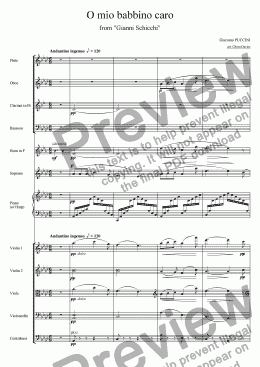Ready to print
You have already purchased this music, but not yet printed it.
This page is just a preview and does not allow printing. To print your purchase, go to the My purchases page in your account and click the relevant print icon.
O mio babbino caro, from "Gianni Schicchi"

Already purchased!
You have already purchased this score. To download and print the PDF file of this score, click the 'Print' button above the score. The purchases page in your account also shows your items available to print.
This score is free!
Buy this score and parts
O mio babbino caro, from "Gianni Schicchi"
$25.95
$3.95
from $2.00
Preview individual parts:
Instant download
You are purchasing high quality sheet music PDF files suitable for printing or viewing on digital devices.Gianni Schicchi is the third and final installment of Il trittico, Giacomo Puccini's trilogy of one-act operas. Though the trilogy itself is not often performed, Schicchi has remained a perennial favorite � well-loved for its lyrical concision and ensemble humor � and is often cited as a masterpiece of Italian comedy.
The story, which comes from an apparently true-to-life passage in Dante's Inferno, was adapted for the stage by the librettist Giovecchino Forzano. A wealthy miser has died, and the greedy members of his family are horrified to find that he has written all of them out of his will. In a scheme to steal back their inheritance, they enlist the help of the morally ambiguous title character, who then succeeds in bilking them out of the money. A side plot involves the young romance between Schicchi's daughter, Lauretta, and a member of the "grieving" (none of them cared a whit for the old man!) family, Rinuccio.
Puccini's score is notable for its use of recurring themes as organizational devices, and the skillful integration of many different characters' short utterances into larger lyrical structures. Lauretta's aria, "O, mio babbino caro" (Oh, my dearest papa), is among the most famous excerpts in all of opera, and certainly the most anticipated moment in any performance. Other memorable moments include the opening "weeping" scene, in which the exaggerated sobbing of the opportunistic relatives combines with clever orchestral underpinnings; and Schicchi's final-scene impersonation of the dead man, Buoso, during which he re-writes "his" will to suit his own liking.
This arrangement is for solo Soprano and small chamber ensemble. The lyrics have been removed due to copyright restrictions.



